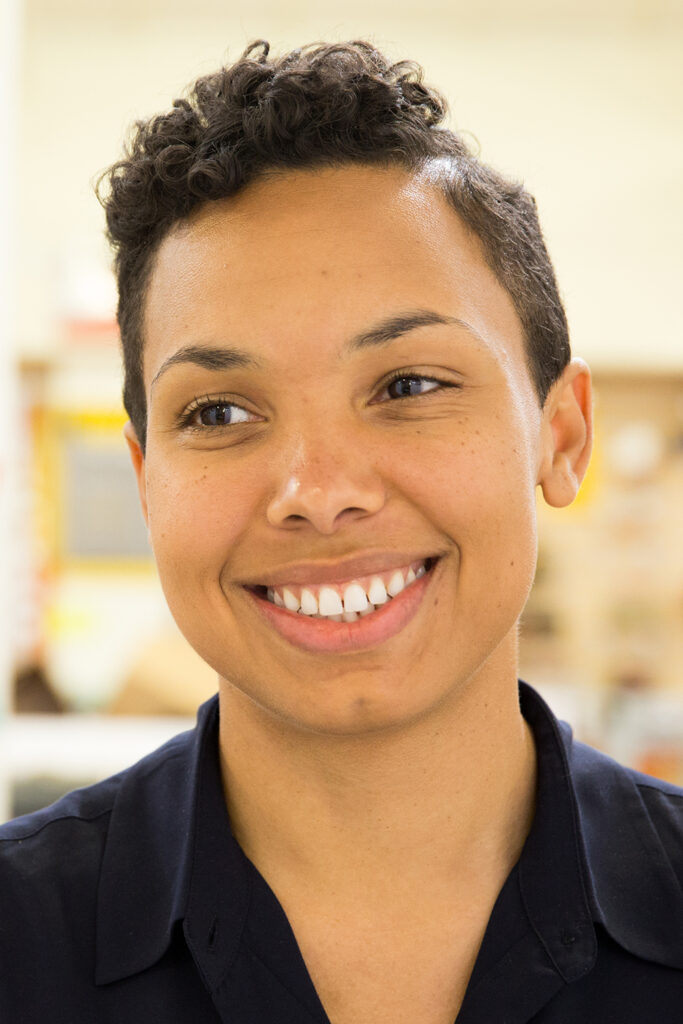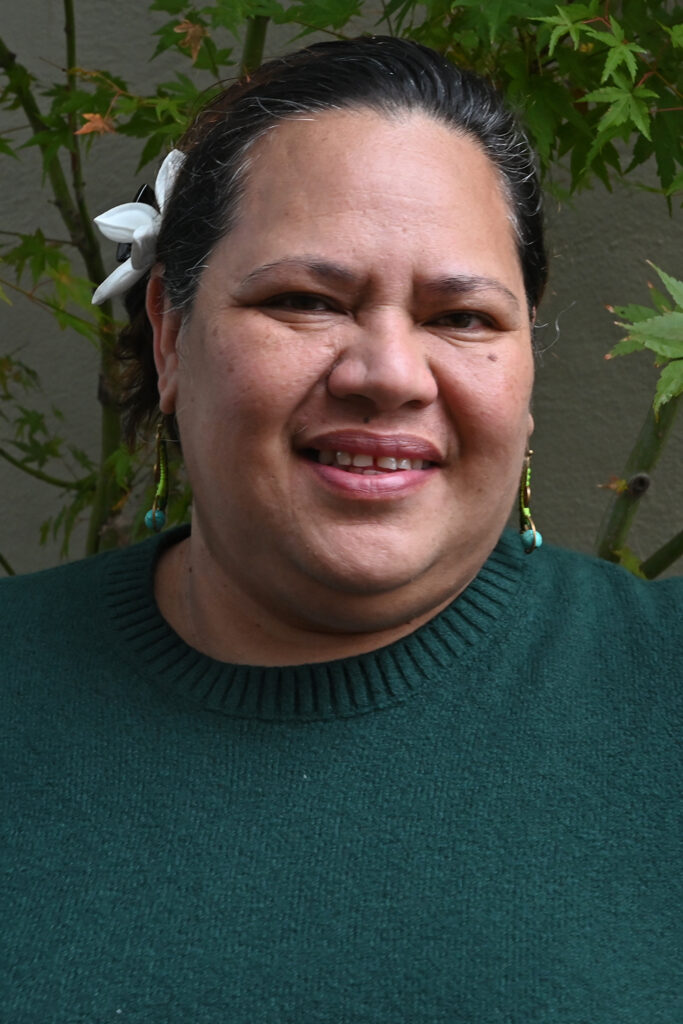Haas Distinguished Visitors focus on environmental justice
The Haas Center for Public Service is thrilled to announce a special Mimi and Peter E. Haas Distinguished Visitor program for 2024 focused on environmental sustainability.
The Haas Center and the Stanford Doerr School for Sustainability are partnering to host four changemakers in sustainability and environmental justice for a winter and spring residency. This program will combine key elements from the Social Entrepreneurs in Residence (SEERS) and Distinguished Visitor programs in an exciting opportunity to bring more community leaders to campus.
The 2024 Distinguished Visitors are Angela McKee-Brown, founder and CEO of Project Reflect; Jason Su, executive director of the Guadalupe River Park Conservancy; Cecilia Taylor, founder, executive director, and CEO of Belle Haven Action; and Violet Wulf-Saena, founder and executive director of Climate Resilient Communities.
All four will begin their residency at Stanford with a panel event on Jan. 25, “Voices of Impact: Joyful and Collaborative Approaches to Sustainable Communities,” in which they will discuss how they work with communities to address environmental justice issues and their goals for their time at Stanford. During spring quarter, they will co-teach the Cardinal Course Challenging the Status Quo: Social Entrepreneurs Advancing Democracy, Development and Justice with lecturer Kathleen Kelly Janus. They will also meet individually with students, faculty, and community leaders.
“The global community is facing unprecedented challenges due to climate change,” said Arun Majumdar, dean of the Stanford Doerr School of Sustainability. “The impacts of rising temperatures, extreme weather events, and other environmental changes are already being felt. To address these challenges effectively, it is essential to learn from individuals and organizations at the front lines of local community work to better understand how we can channel innovation towards these urgent needs.”
The Distinguished Visitor program brings to campus prominent individuals whose lives and careers have had significant public impact and who have distinguished themselves in one or more forms of public service. Previous visitors have included physicians, educators, journalists, organizers, artists, and politicians.
The SEERS program gathers a group of leaders who are taking groundbreaking approaches to advancing social, economic, and political change. Fellows deepen their work by building connections with centers across campus, meeting with faculty, and working on a community-based project with a group of students through the Cardinal Course.
“Building a network of changemakers allows for the exchange of knowledge and best practices,” said Yi-Ching Ong, executive director of the Haas Center. “We hope that connecting these individuals with each other and Stanford will facilitate capacity building within the community, catalyze new inquiry for students, and both inspire and empower individuals and organizations to implement more effective and sustainable initiatives.”
Angela McKee-Brown is the founder and CEO of Project Reflect, a food systems design lab that develops and builds meaningful, just, and joyful food experiences with communities. She built the organization while serving as the entrepreneur in residence at Emerson Collective. Prior to launching Project Reflect, Angela served as the executive director of The Edible Schoolyard Project, a nonprofit dedicated to designing hands-on educational experiences in the garden, kitchen, and cafeteria that connect children to food, nature, and each other. Angela has also served as the director of innovation and strategy with San Francisco Unified School District’s Future Dining Experience, where she and her team leveraged private funding and the support of a $20 million bond to redesign the school food system of San Francisco. Angela holds a master’s in food studies from NYU and lives in Oakland with her wife, Annemarie.
“My goal in engaging with students is to support them in understanding joy as a resource for transformative systems change,” McKee-Brown said. “Our society and institutional systems are in need of paradigm shifts, and I firmly believe that the students have the ideas capable of prompting these shifts. As we explore these ideas, my aim is to share how joy can play a key role in shaping new outcomes and realities that bring about justice and liberation.”
Jason Su is an urban designer focused on the power of social infrastructure to advance social cohesion, civic engagement, shared prosperity, and environmental sustainability. He serves as the executive director of the Guadalupe River Park Conservancy, leading strategy, engagement, partnerships, and team building for the active use and development of the Guadalupe River Park in downtown San Jose. This 254-acre, 3-mile civic greenway makes up the most urbanized portion of the 14-mile Guadalupe River watershed, which holds great ecological, archeological, and cultural significance. His previous experience in San Jose, Oakland, and San Francisco involved retrofitting a parking garage with ground-floor retail, implementing murals and pocket parks, long-range city planning, teaching university courses on community planning, and improving streetscape design. Jason earned a master’s degree in urban planning from San Jose State University and a bachelor’s in sociology and business economics from University of California, Irvine.
“Our parks are a primary way our local government could build civic trust with our community,” Su said. “Ongoing trust cannot be built on treating community assets as discretionary. We need to invest in our parks as vital social infrastructure. They are pivotal to our resilience through the pandemic and the following recovery – not only for their societal, health, and environmental benefits, but also nurturing the foundation of civic engagement needed to address complex community priorities.”
Cecilia Taylor is the founder, executive director, and CEO of Belle Haven Action, an organization that advocates for inclusion and the equitable distribution of resources for the residents of the Belle Haven Neighborhood in the City of Menlo Park. She is a second-generation Belle Haven resident, and her greatest passion is for her community to be recognized and valued at all levels of government. Cecilia was elected as mayor of Menlo Park this year and has served on the City Council since 2018. She is the first African American from the Belle Haven neighborhood to serve on the Menlo Park City Council since 1986, and the first African American woman to serve as the city’s mayor. She served for over 10 years on the Adhoc Advisory Board for San Mateo County Housing Authority and is a Community Emergency Response Team volunteer. She is a board member of K-Star Productions; American Teachers Council, Inc.; SMC Community Project; and Job Train. As a council member, Cecilia serves on five county boards, including Liaison for San Mateo County Flood and Sea Level Rise Resiliency District, Emergency Services Council, and City County Association of Government. In 2021, Cecilia was named Senate District 13 Community Champion by California State Senator Josh Becker. She holds a bachelor’s degree in mathematics from San Francisco State University as well as a certificate in early childhood education.
“My husband and I were displaced and only able to afford a family rental in Menlo Park (where I grew up). I saw all of the development happening around the community and not much investment in the community,” Taylor said. “I decided to start attending community meetings and city council meetings, and I ran for office in 2016. Although my campaign was very successful, I was not elected. And I knew at that moment the work must continue.”
Violet Wulf-Saena is the founder and executive director of Climate Resilient Communities, an organization that supports under-resourced communities of color at the frontline of climate change and sea-level rise. Her dedication to elevating community voices and responding to environmental injustice is rooted in her lived experience in the South Pacific. She has served as an international climate change expert with the United Nations’ Least Developed Countries and Small Island States to protect communities from the impacts of climate change. She now works in the Bay Area partnering with governments, research institutions, and community-based organizations to build community capacity to respond to climate change and sea-level rise. Violet also serves as the equity program manager for the Bay Area Climate Adaptation Network, an environmental justice advisor for the San Francisco Bay Conservation and Development Commission, and a community advisory council member to the Bay Area Air Quality Management District. Violet has a master’s degree in environmental management from Duke University, a bachelor’s in environmental studies from the University of the South Pacific in Fiji, and postgraduate diplomas in environmental and climate change management from Dresden University in Germany, Erasmus University in the Netherlands, and Waikato University in New Zealand.
“Growing up, I witnessed my people and home, Samoa, suffer from the impacts of climate extremes like flooding, hurricanes, and drought,” Wulf-Saena said. “Despite these setbacks, I have also seen my people, and communities in the Bay Area, join hands to recover and support the most vulnerable. With my time at Stanford, I hope to show the students how they can change the world by supporting and elevating the voices of one community at a time.”
The Distinguished Visitor Lecture on Jan. 25 is free and open to all members of the Stanford community and general public. Prior to the panel, attendees are invited to meet the Distinguished Visitors at a reception. The panel will conclude with a Q&A. Register to attend or contact the Haas Center for more information.



